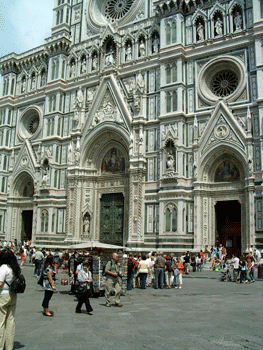Italian Intermediate 1
Avanzato/Esperto - B2/C1
This course will develop your skills in reading and writing, speaking and listening. You will interact using the speech-
Santa Maria del Fiore - Firenzerecognition software in dialogues that respond intelligently to your choices. Your language production is always linked to comprehension.
In Italian Intermediate 1, you will recycle your basic skills through practical scenarios to develop your ability to understand and express yourself fluently in the Italian language. You will be able to manage everyday situations relating to travel by car, rail or air. You will be able to book a hotel and speak with customs agents. For more details, see the lessons outlined below.
Click here for for information on how to begin work with your course.
These lessons are based on the TMM language program "Italian, Advanced/Expert, Level B2/C1, General Situations, All Skills."
1.In macchina 2:19
Learn the expressions you need to take a car trip. Discuss the route with your traveling companion and agree or disagree. Describe a vehicle and ask for precise information about addresses.
- Famigile lessicali. Trasporti stradali, spazio, città.
- Grammatica. La forma impersonale, il pronome "chi," i suffissi "-evole," "-abile" e "-ibile."
- 2. Attività culturali Words and grammar are only parts of a system of communication … the cultural context is also important. These brief lessons provide an insight into an aspect of Italian language and culture.
3. In autostrada 2:28
Practice expressions for giving driving directions, filling the tank and speaking with a traffic control officer.
- Famiglie lessicali. Guida, aspetti tecnici ai trasporti, leggi e regolamenti.
- Grammatica. Espressioni con "stare," la parola "appena," i verbi "toccara a," spettare a" y como esprimere il dovere.
4. L'arrivo in aeroporto 2:41
Air travel can be stressful - here you will learn the Italian words and expressions you need to make the trip much easier. Check bags, choose your place in the airplane, go through customs and make some purchases in the duty-free shops, until it's time to board the plane.
- Famiglie lessicali. Trasporti, tempo, vacanze e viaggi, spazio.
- Grammatica. Il complemento di specificazione, la parola "solito."
5. Benvenuti a bordo! 2:05
Continue your flight with this lesson, where you will learn how to ask about the progress of the the trip, find the restroom and choose a film. Collect your baggage on arrival. Not there? Learn how to ask about your missing luggage.
- Famiglie lessicali. Riflessione, argomentazione, spiegazione, voluntà, desiderio, gesti e senso.
- Grammatica. I verbo "bastare" e la parola "più."
6. Alla stazione 2:21
Now that you have arrived, you want to take a trip on the train. Learn how to ask about the schedule and book your ticket.
- Famiglie lessicali. Spostamenti in treno e in aereo, mezzi pubblici.
- Grammatica. Il plurale, le parole "fa," "prima" e "da."
7. In treno 2:32
Boarding the train, you can now ask for information from the conductor and talk about your trips with a fellow traveller.
- Famiglie lessicali. Svolgimento del viaggio, compera, vendita, velocità.
- Grammatica. Esprimere la frequenza, diverse funzioni di "ne" y l'avverbio "presto."
8. Passare la frontiera 2:16
Crossing a border can mean you need to present your passport and identify yourself. Learn how to speak with the border crossing officials and identify yourself in detail.
- Famiglie lessicali. Mondo, distribuzione geografica, paesi, nazionalità, lingue, identità, periodi della vita, distanza.
- Grammatica. Gli avverbi di luogo "qua" e "qui," "la" e "li," esprimere l'accaduto.
9. Al confine 2:32
Continue into the country and speak to the customs agents about the contents of your bag.
- Famiglie lessicali. Tipi di vestiti, accessori, prodotti.
- Grammatica. Gli aggettivi dimonstrativi, il verbo "fare" y il comparativo di uguaglianza.
10. Trovare un albergo 2:42
You have come quite a long way and now you need to rest. Contact a hotel and book a room.
- Famiglie lessicali. Albergo, mobili, necessità, capacità e difficoltà.
- Grammatica. La parola "certo," gli aggettivi ordinali, esprimere l'alternativa.
11. Una notte in albergo 2:15
On arrival at the hotel, you will need to ask some questions about your room, where breakfast is served, what other facilities are available and pay your bill.
- Famiglie lessicali. Biancheria per la casa, elettrodomestici, luoghi, attività sportive.
- Grammatica. Uso del verbo "potere."
12. Visita della città 2:22
Now that you are settled in, it's time to look around. Learn how to ask about the local attractions in your new locale.
- Famiglie lessicali. Luoghi pubblici, religione, paesaggi.
- Grammatica. Gli anni.
- 13. Attività culturali
14. Visita del castello 2:30
In this lesson you will continue your trip with more vocabulary to help you tour your new city by visiting a castle.
- Famiglie lessicali. Alloggio, arte, arredamento.
- Grammatica. Il condizionale presente, la parola "come."
- 15. Attività culturali
When you have completed Lezione 15, take the Language Achievement Test in Tell Me More. You will find it on your TMM Homepage by clicking the "Tests" tab. This assessment becomes available when you have completed thirty-six hours of practice with Tell Me More.
Congratulations on your new level of proficiency! Let your instructor know whether you want your Language Achievement Test outcome entered on your Certificate of Course Completion.